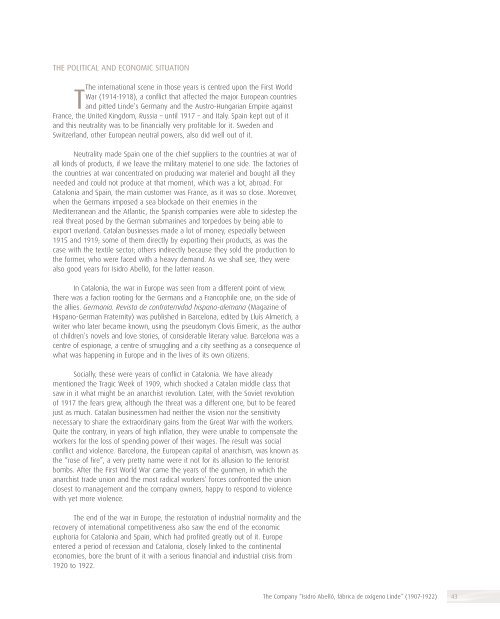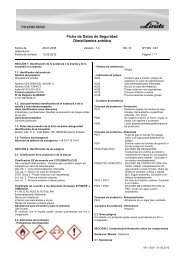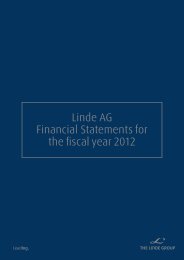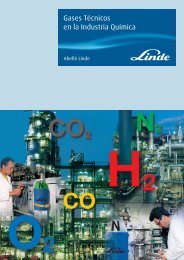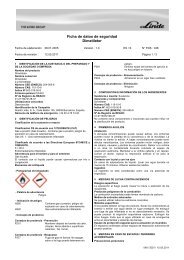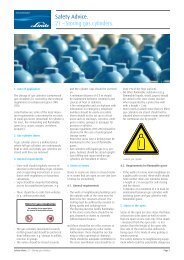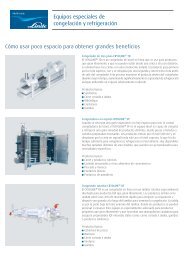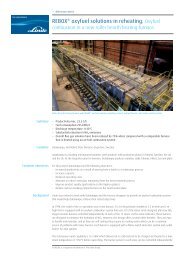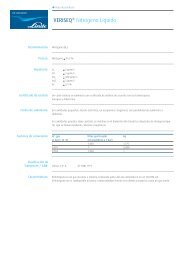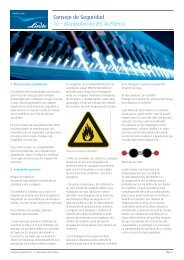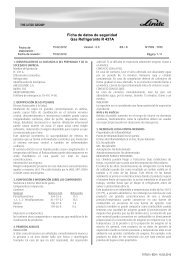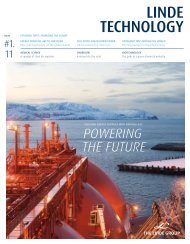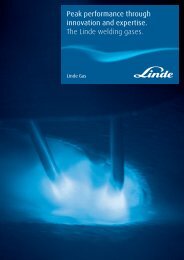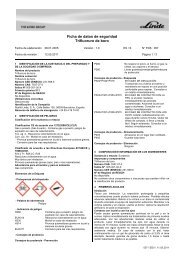Abelló Linde Centenary Book
Abelló Linde Centenary Book
Abelló Linde Centenary Book
You also want an ePaper? Increase the reach of your titles
YUMPU automatically turns print PDFs into web optimized ePapers that Google loves.
THE POLITICAL AND ECONOMIC SITUATION<br />
The international scene in those years is centred upon the First World<br />
TWar (1914-1918), a conflict that affected the major European countries<br />
and pitted <strong>Linde</strong>’s Germany and the Austro-Hungarian Empire against<br />
France, the United Kingdom, Russia – until 1917 – and Italy. Spain kept out of it<br />
and this neutrality was to be financially very profitable for it. Sweden and<br />
Switzerland, other European neutral powers, also did well out of it.<br />
Neutrality made Spain one of the chief suppliers to the countries at war of<br />
all kinds of products, if we leave the military materiel to one side. The factories of<br />
the countries at war concentrated on producing war materiel and bought all they<br />
needed and could not produce at that moment, which was a lot, abroad. For<br />
Catalonia and Spain, the main customer was France, as it was so close. Moreover,<br />
when the Germans imposed a sea blockade on their enemies in the<br />
Mediterranean and the Atlantic, the Spanish companies were able to sidestep the<br />
real threat posed by the German submarines and torpedoes by being able to<br />
export overland. Catalan businesses made a lot of money, especially between<br />
1915 and 1919; some of them directly by exporting their products, as was the<br />
case with the textile sector; others indirectly because they sold the production to<br />
the former, who were faced with a heavy demand. As we shall see, they were<br />
also good years for Isidro Abelló, for the latter reason.<br />
In Catalonia, the war in Europe was seen from a different point of view.<br />
There was a faction rooting for the Germans and a Francophile one, on the side of<br />
the allies. Germania. Revista de confraternidad hispano-alemana (Magazine of<br />
Hispano-German Fraternity) was published in Barcelona, edited by Lluís Almerich, a<br />
writer who later became known, using the pseudonym Clovis Eimeric, as the author<br />
of children’s novels and love stories, of considerable literary value. Barcelona was a<br />
centre of espionage, a centre of smuggling and a city seething as a consequence of<br />
what was happening in Europe and in the lives of its own citizens.<br />
Socially, these were years of conflict in Catalonia. We have already<br />
mentioned the Tragic Week of 1909, which shocked a Catalan middle class that<br />
saw in it what might be an anarchist revolution. Later, with the Soviet revolution<br />
of 1917 the fears grew, although the threat was a different one, but to be feared<br />
just as much. Catalan businessmen had neither the vision nor the sensitivity<br />
necessary to share the extraordinary gains from the Great War with the workers.<br />
Quite the contrary, in years of high inflation, they were unable to compensate the<br />
workers for the loss of spending power of their wages. The result was social<br />
conflict and violence. Barcelona, the European capital of anarchism, was known as<br />
the “rose of fire”, a very pretty name were it not for its allusion to the terrorist<br />
bombs. After the First World War came the years of the gunmen, in which the<br />
anarchist trade union and the most radical workers’ forces confronted the union<br />
closest to management and the company owners, happy to respond to violence<br />
with yet more violence.<br />
The end of the war in Europe, the restoration of industrial normality and the<br />
recovery of international competitiveness also saw the end of the economic<br />
euphoria for Catalonia and Spain, which had profited greatly out of it. Europe<br />
entered a period of recession and Catalonia, closely linked to the continental<br />
economies, bore the brunt of it with a serious financial and industrial crisis from<br />
1920 to 1922.<br />
The Company “Isidro Abelló, fábrica de oxígeno <strong>Linde</strong>” (1907-1922) 43


